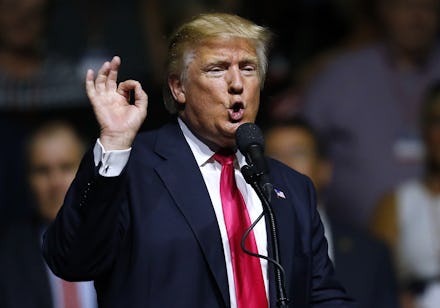Donald Trump says "inner-city" crime is near "record levels." Here's why he's wrong.

Donald Trump on Monday asserted that crime in the nation's inner cities is "reaching record levels" — a claim that flies in the face of the data.
The Republican presidential nominee's assertion came during a stampede of fiery tweets Monday morning, when he asked "how many more shootings" it would take to convince African-Americans and Latinos to support his campaign.
Over the weekend, Trump seized on the shooting death of NBA star Dwyane Wade's cousin in Chicago, arguing that it would spur black people to "VOTE TRUMP!"
In seeking to broaden his appeal beyond a narrow slice of conservative whites, Trump has been depicting communities of color as crime- and unemployment-plagued war zones — attracting fierce criticism from black scholars and advocates.
But Trump's claim that "inner-city" crime is near a record is the tallest of the flamboyant showman's tall tales about life for people of color.
For starters, both property crime and violent crime have steadily decreased from their early-1990s highs, PolitiFact noted in June.
"As a nation, we are far better off than anytime for the past several decades. Crime rates are low, and there is no consistent and reliable indication that things are getting worse," Northeastern University criminologist James Alan Fox told the site.
To be sure, Trump specifically mentioned "inner-city" crime on Monday. But narrowing the focus to those areas does nothing to bolster his case.
Compiling data from the FBI, FactCheck.org laid out in July how murder and non-negligent manslaughter in the nation's major cities is nowhere near the record levels of about a quarter-century ago. Only Baltimore and Milwaukee did such crimes come close to matching their all-time peak last year.
Homicides did increase in some major cities — including Chicago, Dallas, Los Angeles and Las Vegas — in the first months of 2016, while dropping in other major cities, like New York. The violent crime uptick in certain pockets of the country has fueled a debate about the so-called "Ferguson effect," whereby mounting public scrutiny of the police fosters a de-escalation in policing and growing lawlessness.
But is crime "reaching record levels"? Not if your point of reference stretches beyond the past half-decade.